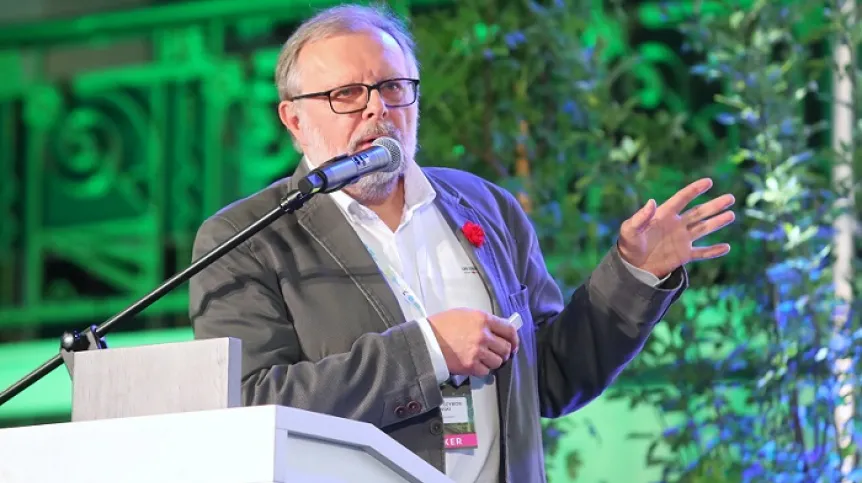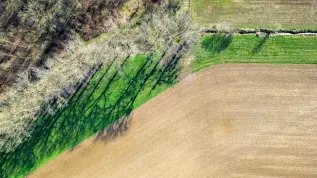
Personal attitudes towards climate change and private actions taken in relation to it show an individual's awareness and willingness to change on a larger scale, but they alone will not change much. Regulations and fundamental changes at a higher level are needed. We will not survive without system-wide changes, believes climatologist Professor Simon Malinowski.
A heat wave in southern Europe has continued for several weeks. China, India and the Caribbean are breaking historical records of air and water temperatures. These are the tangible effects of climate change, which is directly caused by huge emissions of greenhouse gases generated by human activity.
We have the potential, we have the right technologies. We just do not have socio-economic solutions that would respond to the situation and enable the implementation of measures. And this is a very big problem.
Although in Poland climate change is felt to a lesser extent than in many other regions, our country is also affected. Average temperatures are higher, snow cover decreases in winter, water resources decrease. At the same time, the intensity of torrential rainfall increases, which leads to more frequent flooding. 'The recent IMWM report shows that the sea level in Świnoujście has risen by 15 cm since 1950, and in Władysławowo - by nearly 20 cm. These rises will accelerate,’ says Professor Malinowski, a climatologist and atmospheric physicist from the University of Warsaw, chairman of the Problem Committee for the Climate Crisis of the Polish Academy of Sciences.
He adds: ’According to the scenarios of the Intergovernmental Panel on Climate Change (IPCC), depending on the level of greenhouse gas emissions, by 2100 the sea level will rise by 0.5 to 1.5 m. This rise means a sharp increase in extreme events related to coastal flooding. None of our infrastructure is prepared for this and it is impossible to prepare for it along the entire length of the coast.’
The professor assesses the state of the climate as critical and says that the only way to stop the situation is to drastically reduce greenhouse gas emissions.
"The current measures now are not very effective. In addition, we as a society do not talk about all this enough,’ he notes. 'At this point, we mention high emissions only in the context of energy, sometimes agriculture - and this is the end of our interests. And because the effects of climate change are not discussed, we as a society are not sufficiently aware to want to take any action.’
As the scientist explains, contrary to appearances, these measures do not have to be associated with great sacrifices. It is more about changing certain habits. 'And, importantly, these changes would affect ordinary citizens to a much lesser extent than the richest. Such a change as a carbon or environmental tax - with appropriate shielding - would most strongly affect a few percent of the richest people in the world and the richest corporations. Because it is them, this fraction of the population, who are responsible for half of CO2 and other greenhouse gas emissions into the atmosphere,’ Malinowski says.
'We have the potential, we have the right technologies. We just do not have socio-economic solutions that would respond to the situation and enable the implementation of measures. And this is a very big problem.’
This way, according to the expert, not much will change. 'The International Monetary Fund reports that subsidies to fossil fuels already amount to about 7 percent of the gross global product. For years, scientists have been calling for governments and banks to do something about it, because regulatory changes depend on them - that is, the only type of action that can bring real results,’ Malinowski says.
He adds: ‘Without top-down, system-wide changes, we will not be able to survive as humanity. We obviously cannot count on mass cooling with air conditioners, like during the World CUP in Qatar, because we do not know how the technologies will work in the case of continuous operation at very high temperatures. Also, it is a very real threat that we will not have the energy resources to power the cooling systems. More seriously, the cheapest geoengineering solutions have a lot of dangerous side effects. Remember that the entire human infrastructure - energy, transport, water and sewage, etc. - is not prepared to function in increasingly extreme conditions.’
Professor Malinowski believes that regulations should be introduced in the entire economy, thanks to which investors and producers will respect the natural dependencies that will determine the future of all people.
'Currently, our socio-economic system does not take this into account in any way. As long as man was a small part of the natural world, everything functioned somehow. Now that when we have converted 70 percent of land, now that the mass of all the products of man is greater than the mass of all the products of nature, now that we have changed the composition of the atmosphere on such a large scale by burning coal, now that we generate more and more new substances over which we have absolutely no control, we should not be surprised that bad things are happening all over the world,’ he says.
According to the climate expert, 'after 20 years of studying the phenomena related to climate change, we know that we are much closer to the edge of survival than we thought 20 years ago'.
Even in the context of elections and voting for a specific party, there is no consideration of how a given party or politician approaches climate change.
This becomes very clear when you look at the annual reports of the Intergovernmental Panel on Climate Change (IPCC). They list a number of critical points in the climate system. In older reports, their possible exceedances were predicted at much higher temperatures than in each subsequent one.
'Only system-wide, political and economic measures can prevent us from crossing dangerous borders,’ Malinowski says, adding that politics depends on people. In his opinion, apart from politicians, the role of climate researchers, but also social psychologists and political scientists is important. They can show how to launch beneficial changes in order to overcome social resistance. 'Numerous teams of scientists are already working on it. The Systemic Risk Research Centre was recently established at the University of Warsaw, where in interdisciplinary groups we try to understand these processes in order to protect ourselves from the worst scenarios,’ he says.
Past experience shows that rapid changes, even large ones, are possible. One just needs to know how to introduce them. 'It often happens that changes against which there is a lot of social resistance turn out to be completely problem-free in the end. An example is the ban on smoking in public places. The resistance was unbelievable: restaurateurs, farmers, tourism - thousands of companies were supposed to collapse, it was considered an attack on the freedom of an individual. And although it happened relatively recently, we do not remember these fears. Everything was introduced smoothly,’ Malinowski says.
'Firstly, it is important that the society is ready to accept the changes. Secondly, it is about wise regulations that will allow to implement changes,’ he adds.
According to Professor Malinowski it is disturbing that even in the context of elections and voting for a specific party, there is no consideration of how a given party or politician approaches climate change. 'We consider various program aspects, we get excited about many issues, including personal animosities, but almost no one takes this factor into account.
‘We say: there is no point in changing anything, because the US, China, etc. will do their thing anyway. And that is a wrong way of thinking. It prevents us from appreciating the important changes that are actually taking place in, for example, China or India. Contrary to popular opinion, China, for example, is aware that it will soon be severely affected by climate change. They take up specific challenges and spend more on them than Europe and the US combined.’
The professor adds that in many countries a 'displacement approach, shifting responsibility onto others' is often observed. ‘We say: there is no point in changing anything, because the US, China, etc. will do their thing anyway. And that is a wrong way of thinking', the climatologist points out 'It prevents us from appreciating the important changes that are actually taking place in, for example, China or India. Contrary to popular opinion, China, for example, is aware that it will soon be severely affected by climate change. They take up specific challenges and spend more on them than Europe and the US combined. Not all of their measures are correct, they also focus mainly on energy, forgetting about biodiversity. But at least they're actually making real changes.’
He adds that the problem has two aspects, both equally urgent and equally important: the climate crisis and the biodiversity crisis.
'A big obstacle that makes solving the problem of warming more difficult is that politicians, who are the only ones with the power to change things, take into account the momentary public moods and do not look at the long term.
'By failing to notice changes in nature - how much we dominate the entire Earth - we keep making very risky, even bad decisions. The paradigm of unconditional economic growth, which is the basis of today's world, is unsustainable in the long run. Therefore, we will either change it or it will disappear with us, because our civilization will collapse.’
All this, he concludes, 'is a very inconvenient truth, so we sweep it under the rug. Meanwhile, our chance lies in facing it. We have to accept it and not run away from the consequences, but instead make conscious choices at the political, economic and finally individual level.
‘It is necessary to introduce a carbon tax, an environmental tax, it can be fiscally neutral thanks to a common dividend or at the expense of reducing other taxes, so that citizens feel it as little as possible.
‘These solutions are discussed among economists, they have prototypes, but there is no social discussion and - then - brave politicians who would +push+ them further. Because, unfortunately, we have a system that depends on momentary support, so only things that bring short term benefits are being said.’
PAP - Science in Poland, Katarzyna Czechowicz
kap/ zan/ kap/
tr. RL













